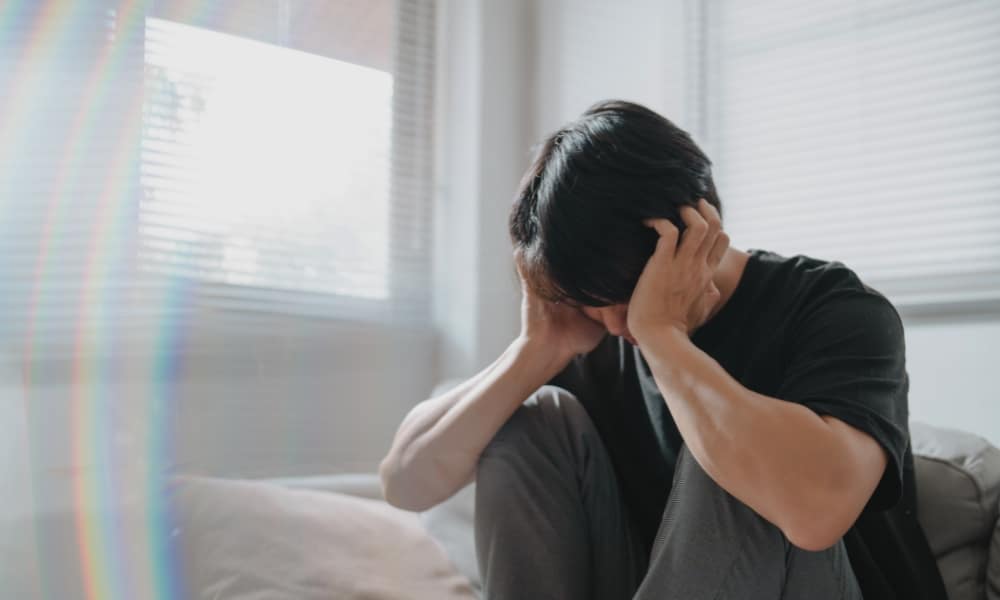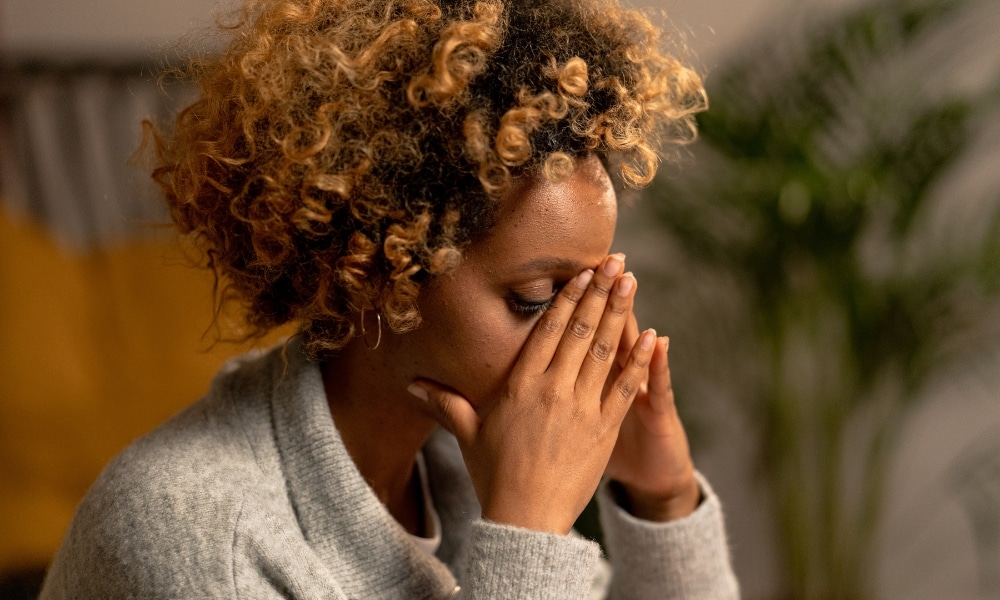Skip To Section
Social anxiety disorder is very common: 15 million American adults have this condition. And it’s not the same as shyness, which tends to be short-term and non-disruptive and can be overcome with encouragement and effort. Social anxiety disorder is chronic, debilitating, and persistent. Until it’s treated, you will likely have trouble working, going to school, or developing new relationships.

What Is Social Anxiety?
Social anxiety disorder is also known as social phobia. It’s a form of anxiety disorder that induces feelings of extreme fear in social settings. People who have social anxiety disorder struggle to:
- Talk to people
- Make new friends
- Attend social events and gatherings
They have a deep-rooted fear of being judged, mocked, or otherwise scrutinized. If you have social anxiety, you might understand that your concerns are unreasonable and still be helpless to overcome them.
Symptoms and Signs of Social Anxiety
The fear behind social anxiety is rooted in a fear of embarrassment—on a much deeper level than simple stage fright. Social anxiety disorder often feeds on itself. You worry that others might notice you’re anxious or stressed, which can cause even more anxiety. Some people turn to alcohol or drugs to work up the courage to interact with others because some substances depress the nervous system and lower inhibitions. This can help them feel like they’re overcoming the anxiety.
The symptoms of social anxiety disorder show how this can be a very serious condition:
- Nausea
- Difficulty speaking
- Dizziness
- Excessive sweating
- Trembling
- Rapid heart rate
You may obsess over social interactions, worrying intensely before a social event. At worst, you may go out of your way to avoid social situations, and if you attend, you’ll do your best to go unnoticed and obsess about your performance afterwards.
When Do People Experience Social Anxiety?
A certain level of anxiety in social situations is normal and might even be healthy. But social phobia pushes the anxiety to extreme levels. It leaves you with a pathological fear of being judged and humiliated. When social anxiety reaches these levels, you might even skip important situations and events, like:
- Job interviews
- Grocery shopping
- Using public restrooms
- Going on dates
- Public speaking
What makes social anxiety disorder even more difficult to live with (and diagnose) is that its symptoms may not appear in all situations. You might be fine when talking to strangers but experience crippling symptoms when going on a date. You can’t choose when and how your symptoms appear, and you don’t necessarily know which activities will be harder than others.
What Causes Social Anxiety Disorder?
Social anxiety stems from both your biology and your environment, like many other mental health disorders.
Factors might include:
- A family history of social phobia – Anxiety disorders tend to be genetic, the presence of social anxiety in your relative doesn’t mean the condition will develop in you.
- Brain structure – The amygdala, the region of the brain responsible for emotional processing and decision-making, may play a role in controlling anxiety. People with well-functioning amygdalae will likely react reasonably to stressful situations. But if your amygdala misfires or is overactive, you will probably experience more fear in general. This fear extends even to non-threatening events and situations, like social settings.
- Environment and setting – It’s possible social anxiety disorder is a learned behavior. This means some people develop the condition after a distressing social situation. Children may develop social anxiety after watching their parents display socially anxious behavior. Parents who are overprotective or controlling may instill social anxiety in their children.

What Is the Relationship Between Social Anxiety and Substance Abuse?
There’s often a connection between social anxiety and substance abuse. Social phobia and alcohol addiction, for instance, are very common co-occurring conditions. Research suggests having an anxiety disorder can increase your chances of developing a substance use disorder.
Children who’ve been severely bullied or otherwise abused may be prone to developing social anxiety disorder in adulthood. Other kinds of trauma, like family conflict or sexual or physical abuse, can make children very scared of other people. Trauma can also lead to substance abuse.
Some drugs cause an anxiety response, such as methamphetamine and hallucinogenics. But the type of anxiety they create is usually more paranoid than anxiety about social situations. Even so, it’s important for drug-induced anxiety to be ruled out before determining whether social anxiety is co-occurring with substance abuse.
Some drugs, like alcohol and opioids, can also cause generalized anxiety during withdrawal. Under the right circumstances, this could develop into a full-blown anxiety disorder. It’s also possible for someone to present with the symptoms of social anxiety disorder for the first time after getting sober, simply because they’ve been using substances to cope with their social anxiety symptoms and no longer have those substances to fall back on.
Social Anxiety and Substance Abuse: A Dual Diagnosis
Having a mental health and substance abuse condition at the same time is called a dual diagnosis. Both diagnoses should be treated at the same time, rather than one after the other. This is because when the two conditions combine, they form a new set of problems that needs its own unique interventions. Treating them separately will likely cause a relapse on whichever condition was treated first.
Many drug and alcohol treatment programs offer specialized treatment plans for dual diagnosis. In one of these programs, you will learn how you developed an addiction to substances. You will also learn the exact ways your substance use has served you. Once you identify your unhealthy coping skills, you can replace them with healthier ones that you learn in treatment.
Anxiety, especially when it has been covered up by substance abuse, can cause a person to spiral after becoming sober. The dual diagnosis treatment approach is beneficial because it’s a supportive recovery community that can help keep you grounded. Otherwise, you might be tempted to give up. When getting sober, you need to have strong coping skills and a supportive environment at the ready.
Alcohol
People with social anxiety disorder have a 20% chance of also having alcohol problems. Many drink to lower their inhibitions so they can feel more comfortable in social situations. Unfortunately, some people behave in embarrassing ways under the influence of alcohol. This can be especially hard if you have social anxiety. The memory of acting unlike yourself while under the influence can push social phobia to extreme levels and may even lead to more substance abuse.
In a boomerang effect, anxiety can also increase as the effects of alcohol wear off. This is the result of fluctuations in brain chemistry.
Marijuana
Research has found significant connections between marijuana and anxiety disorders. Like alcohol, cannabis can temporarily calm anxiety. Many users report feeling dissociated, or disconnected, from their usual anxiety.
At higher doses, cannabis can induce anxiety and paranoia, which can make social anxiety worse. As with alcohol, cannabis can also induce higher levels of anxiety between periods of use.
A study in the Depression and Anxiety journal showed that out of 107 marijuana users, 26% had social anxiety disorders. Patients experienced worsening cognitive and behavioral problems because of how the conditions interacted. Other studies show that people who have social anxiety disorder use more cannabis. They’re more likely to continue using it even when they know it will make their symptoms worse.
Stimulants
Stimulants are effective because they jumpstart your sympathetic nervous system. This is what activates the release of adrenaline and your flight-or-fight response. These responses are connected to how you experience anxiety. Things in your environment can naturally cause your fight-or-flight response, but stimulants can make the anxiety response last much longer.
Self-Assessment: Am I Addicted?
"*" indicates required fields
Contact Form
Would you like help?
"*" indicates required fields
Healthier Ways to Manage Anxiety
Anxiety is a normal—even healthy—response to stress. Without anxiety and adrenaline, your body and mind cannot overcome adversity. Human beings evolved as a social species, so it’s natural to be concerned about what others think of you.
But nature and nurture can inflate these perfectly healthy feelings to overwhelming degrees. Social anxiety disorder distorts the reality of your environment, setting, or situation. The phobia exaggerates any sense of danger or consequences. But you can learn to manage your social anxiety by identifying your exaggerated thoughts and changing them.
Relabeling & Breathing
One way to cope is by relabeling. In many ways, anxiety and excitement are two sides of the same coin, and they have many symptoms in common. The surge of adrenaline is usually associated with anxiety. Through practice and training, you can change the thought from, “I’m anxious” to, “I’m excited.” A quick relabeling like this can empower you.
Breathing exercises are a great way to cope with social anxiety. Most people feel that when their anxiety starts to kick in, it will uncontrollably spiral. But practicing diaphragmatic breathing is clinically proven to ease anxiety. It involves slow, deep breaths from the stomach.
With practice, breathing to control anxiety can become natural and even easy. Part of the process is being aware of your breathing when you feel an anxiety attack coming on. Then you learn to implement the breathing techniques to get the anxiety under control.
Grounding
Grounding is a way of shifting mental focus to think less about your anxiety symptoms. Instead, you focus on anything else: the task at hand or things around you. This is a mechanism of acceptance and commitment therapy, which posits that certain experiences are worth the anxiety. Patients are encouraged to endure distressing feelings in order to continue making the most of their lives.
Therapy
Identifying your anxious thoughts and changing them isn’t easy to do! And some people have severe social anxiety disorder that cannot simply be “thought” around. This is where therapy can be vital. A psychologist teaches you to control your anxious thoughts. You can learn to see through them to the reality of the situation, not what anxiety wants you to see.
If you’re struggling with social anxiety and substance abuse, it’s crucial to treat both disorders at the same time. Many of the therapies that help with addiction also help with social anxiety. To learn more about treating these co-occuring disorders, contact Footprints to Recovery today.
- Social Anxiety Disorder: Causes, Symptoms, and Diagnosis
- Social Anxiety Disorder – ADAA
- Anxiety: What it is, what to do – Harvard Health
- Social anxiety disorder (social phobia) – Symptoms and causes – Mayo Clinic
- Is Anxiety Genetic? What Causes Anxiety and How to Feel Better
- What Happens in the Amygdala… Damage to Brain’s Decision-Making Area May Encourage Dicey Gambles | Scientific American
- Anxiety and Substance Use Disorders: A Review – PMC
- Substance use, childhood traumatic experience, and Posttraumatic Stress Disorder in an urban civilian population – PMC
- Forgiving Yourself for Embarrassing Drunken Behavior | HealthyPlace
- The Risks of Using Alcohol to Relieve Anxiety
- You Asked, We Answered: Why Do You Feel Anxious After Drinking Alcohol?
- Social Anxiety Disorder and Marijuana Use Problems: The Mediating Role of Marijuana Effect Expectancies – PMC
- Panic Disorder Definition, Causes, and Treatment
- 4-7-8 breathing: How it works, benefits, and uses
- Effectiveness of Acceptance and Commitment Therapy on Interpersonal Problemsand Psychological Flexibility in Female High School Students With Social Anxiety Disorder
Our admissions team is available 24/7 to listen to your story and help you get started with the next steps.








